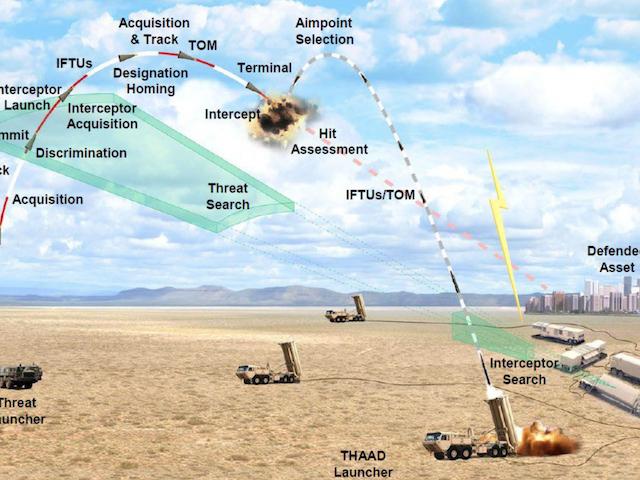In a strategic move that signals unwavering U.S. support for Israel’s security, the Pentagon has announced the deployment of a Terminal High Altitude Area Defense (THAAD) air defense battery to Israel. This critical action, authorized by U.S. Secretary of Defense Lloyd Austin at the direction of President Joe Biden, is expected to significantly strengthen Israel’s integrated air defense system amidst increasing threats from Iran and its proxy militias.
According to Pentagon spokesperson Major General Pat Ryder, the deployment of THAAD is not just a show of solidarity but a concrete step to reinforce Israel’s defensive posture. "This deployment underscores the United States' ironclad commitment to the defense of Israel and Americans in the region," Ryder emphasized, adding that the THAAD system is specifically designed to counter ballistic missile threats—an area where Iran has been actively expanding its capabilities.
At the direction of the President, Secretary Austin authorized the deployment of a Terminal High-Altitude Area Defense (THAAD) battery and associated crew of U.S. military personnel to Israel to help bolster Israel's air defenses following Iran's unprecedented attacks against… pic.twitter.com/P2FJVaOqIt
— U.S. Central Command (@CENTCOM) October 13, 2024
Strengthening Israel’s Defenses: A Strategic Necessity
The THAAD battery is expected to play a crucial role in enhancing Israel's ability to neutralize potential missile threats, especially from Iran, which has been steadily increasing its influence across the Middle East through both direct and proxy activities. Israel, already possessing one of the most advanced air defense networks in the world, will now benefit from the additional layer of protection that the THAAD system provides.
This step comes at a particularly volatile time for the region, following the deadly October 7 attacks by Hamas on Israeli civilians. Since then, the U.S. has intensified its military presence across the Middle East, sending a clear message to any actor contemplating further aggression: the United States stands resolutely with its Israeli ally.
The Pentagon has announced the Immediate Deployment of a Terminal High Altitude Area Defense (THAAD) Battery operated by U.S. Soldiers to Israel, in order to Bolster Israeli Defenses against any Future Attack by Iran using Ballistic Missiles. pic.twitter.com/TxJtSbemin
— OSINTdefender (@sentdefender) October 13, 2024
While this is not the first time the U.S. has deployed a THAAD battery to the region—previous deployments occurred in 2019 for joint defense exercises—this time the stakes are higher. The latest deployment includes approximately 100 U.S. troops, marking a rare occurrence of American military personnel operating inside Israel, underlining the gravity of the situation and the seriousness with which the U.S. regards the Iranian threat.
The Iranian Threat: Escalating Tensions and the Role of THAAD
The decision to deploy THAAD follows Iran's latest provocations, including missile attacks on American interests and their proxies' increasing aggressions throughout the region. While Washington has sought to diplomatically caution Israel against striking Iranian nuclear sites or oil fields, the deployment of the THAAD system indicates that the U.S. military is prepared for the worst-case scenario, should the conflict escalate further.
A standard U.S. THAAD battery, like the one being deployed to Israel, can intercept up to 72 incoming ballistic missiles, even in space @LucasFoxNews pic.twitter.com/ET62tgMxFo
— Open Source Intel (@Osint613) October 13, 2024
The THAAD system itself is a marvel of modern defense technology, designed to intercept and destroy short- and medium-range ballistic missiles during their terminal phase. Given Iran's burgeoning missile capabilities, which pose a serious threat not only to Israel but to U.S. forces stationed across the region, the THAAD deployment adds a formidable defensive layer that could prove decisive in any potential conflict with Tehran.
This deployment is part of broader U.S. military adjustments in the region. Since the October 7 attacks, the Pentagon has significantly ramped up its presence by deploying warships and aircraft carriers to the eastern Mediterranean, Red Sea, and Arabian Sea, as well as positioning troops in strategic locations like Cyprus for possible evacuation operations. The coordination between the U.S. and Israel has been extensive, with American officials consulting closely with their Israeli counterparts on how best to respond to future threats.
BREAKING:
— Visegrád 24 (@visegrad24) October 13, 2024
The U.S. announces that it’s sending a battery of the Terminal High-Altitude Area Defense (THAAD) air defense system to Israel.
The system can shoot down ballistic missiles in space.
Around 100-200 U.S. soldiers are usually needed to operate a THAAD battery.
🇺🇸🇮🇱 pic.twitter.com/rZgtiNduud
U.S.-Israel Relations: A Symbol of Resilience
The decision to bolster Israel’s defenses also symbolizes the deep and resilient bond between Washington and Jerusalem, especially in times of crisis. President Biden's recent phone conversation with Prime Minister Netanyahu—his first in two months—reaffirmed this commitment, with Biden advocating for a "proportional" Israeli response to Iran’s provocations. While the U.S. continues to stress diplomatic restraint, it is clear that military preparedness is at the forefront of American strategy in the region.
In this context, the THAAD deployment serves not only as a strategic military measure but also as a potent symbol of the U.S.-Israel alliance. The message is unmistakable: any attack on Israel will be met with an unrelenting defense. With THAAD now augmenting Israel’s already sophisticated defense network, the country is more prepared than ever to face down any threat, be it from Iran or any other adversary in the region.
Should have been done long time ago…
— Mosab Hassan Yousef (@MosabHasanYOSEF) October 13, 2024
The United States will immediately deploy THAAD missile defense system to Israel.
Is this a defensive move or preparation for a major offensive against the Islamic republic? pic.twitter.com/FkORdNcZRB
This historic step marks another chapter in the enduring partnership between the U.S. and Israel, reinforcing that, in the face of common enemies, the two nations remain as committed as ever to ensuring the security and stability of the region.


